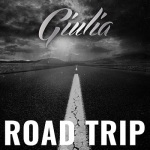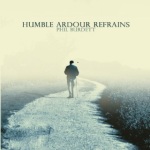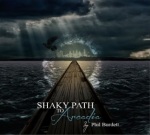 It’s less than a year since I first saw Sound of the Sirens doing a support set for Mad Dog Mcrea at The Half Moon in Putney. It’s been an eventful ten months for Abbe and Hannah, with festival appearances and a headline show in their home town of Exeter, and this time around they were headlining a sellout gig at St Pancras Old Church, so absolutely no pressure at all. The venue was a pretty inspired choice; it’s an intimate setting but big enough to cope with the full dynamic range of Sound of the Sirens, from a cappella to two guitars, two voices and percussion. The stage was lit by a bedside lamp at either side, creating a cosy ambience which worked well for the performers.
It’s less than a year since I first saw Sound of the Sirens doing a support set for Mad Dog Mcrea at The Half Moon in Putney. It’s been an eventful ten months for Abbe and Hannah, with festival appearances and a headline show in their home town of Exeter, and this time around they were headlining a sellout gig at St Pancras Old Church, so absolutely no pressure at all. The venue was a pretty inspired choice; it’s an intimate setting but big enough to cope with the full dynamic range of Sound of the Sirens, from a cappella to two guitars, two voices and percussion. The stage was lit by a bedside lamp at either side, creating a cosy ambience which worked well for the performers.
Annie Rew Shaw, also from Devon, was first on stage, playing her melancholic piano-backed songs of sorrow and loss, helped out by an occasional bit of fiddle accompaniment. The songs, and Annie’s fabulous voice, got a good response from an appreciative audience. Tom Figgins was up next; again the songs were good and Tom’s swooping, soaring delivery kept the audience enthralled throughout his set. Both support sets were really strong performances, building up towards the headliners without threatening to steal their thunder.
The runaway train that Sound of the Sirens were riding for most of last year could have been derailed at any time if they hadn’t been prepared for it, but they took everything in their stride and looked completely unfazed by their increasing popularity. Becoming a headline attraction almost overnight (after years of hard work) is a huge challenge that Abbe and Hannah seem to be dealing with pretty well at the moment.
Wednesday’s gig was a ninety minute set, a huge leap from the tight thirty minute support sets they’ve been doing for so long. A lot of bands with one album would struggle to find material to fill an extra hour, but with an album, three EPs and a constant stream of new songs, they made it look like the easiest thing in the world. They both like to interact with the audience and their intriguingly random humour builds a strong rapport between songs as guitars are swapped and mandolins retuned.
They took the opportunity that the longer set presented to build up the momentum, ease back a little and then build again to a barnstorming climax with the live favourites “The Gift” and “Together Alone”. The rest of the set was a mix of songs from the three EPs (including “The Fear”, “Next Year”, “All That I Could Find” and “Stars”) the album “A Long Way to Fall” (including “The Night Before”, “Up to the House” and the magnificent “Faith in Fire”) and a few surprises. There was a cover of The Maccabees “Pelican” and a few new (or unrecorded) songs including “Best Intentions, “For All Our Sins”, “Cross Our Hearts” and “Smokescreen”.
Any nervousness that Abbe and Hannah had before the gig didn’t last very long. It’s fair to say that the audience were onside right from the start but, by the end of the night, the potent mix of well-crafted and powerful songs, superb harmonies and counterpoint and sheer enthusiasm sent everyone home buzzing. I suspect it won’t be too long now before Sound of the Sirens will be playing in a venue near you.
 It would be a little bit too easy to dismiss Giulia’s musical career as a vanity project but give this single an open-minded listen and you’ll probably change your mind. You’ll realise that she has an interesting voice with just enough of a raw edge to make it stand out against the background of the identically-schooled pop voices that you hear every time you turn on the radio. The combination of her songwriting and voice has managed to snag her a deal with M:89 records to release an album later this year and the single “Road Trip” this month.
It would be a little bit too easy to dismiss Giulia’s musical career as a vanity project but give this single an open-minded listen and you’ll probably change your mind. You’ll realise that she has an interesting voice with just enough of a raw edge to make it stand out against the background of the identically-schooled pop voices that you hear every time you turn on the radio. The combination of her songwriting and voice has managed to snag her a deal with M:89 records to release an album later this year and the single “Road Trip” this month.
The song is a rock-pop hybrid bouncing along on a wave of tribal drums, acoustic guitars and a Celtic-sounding keyboard hook which gets all the way to the chorus before the pulsing bass pushes it firmly into contemporary radio territory. It works as a pop tune, and it’s an intriguing taster for the album “Raze Me to the Ground” which is scheduled for late May release.
Don’t take our word for it. Have a look and listen for yourself:
 A long time ago, I really struggled with the musical concept that the most important thing wasn’t the notes, but the space between the notes. I was a bit literal and musically unsophisticated at that time, but I managed to get my head around the idea before it got me into any arguments. The reason I’m inviting you to have a laugh at my expense here is that Phil Burdett’s album “Humble Ardour Refrains” has some wonderful examples of using the space between the notes to create atmosphere and emotion. This is one of two albums that Phil’s releasing simultaneously on Drumfire Records (you can read about “Shaky Path to Arcadia” here) and if you take the two albums together, it’s an extraordinary achievement.
A long time ago, I really struggled with the musical concept that the most important thing wasn’t the notes, but the space between the notes. I was a bit literal and musically unsophisticated at that time, but I managed to get my head around the idea before it got me into any arguments. The reason I’m inviting you to have a laugh at my expense here is that Phil Burdett’s album “Humble Ardour Refrains” has some wonderful examples of using the space between the notes to create atmosphere and emotion. This is one of two albums that Phil’s releasing simultaneously on Drumfire Records (you can read about “Shaky Path to Arcadia” here) and if you take the two albums together, it’s an extraordinary achievement.
He’s used the same musicians (with the addition of flute and sax on this album from Paula Borrell) to produce two very different albums; musically, “Humble Ardour Refrains” has a more acoustic, folky vibe and there’s a much more confessional, intimate feel to the autobiographical material. I’m sure that everyone listening to this will pick out different songs that they love, but my instant favourite was “A Kind of Chalkwell Station Blue”; Russ Strothard’s melodic bass line works perfectly with John Bennett’s clipped guitar and Jack Corder’s congas to create a backing that rolls along seemingly effortlessly under Phil’s sub-apocalyptic vision of Southend and Canvey. When you add Paula Borrell’s meandering flute, the result is sublime. It’s a song that took me back to John Martyn at this very best.
If we’re talking comparisons (and we are), Tom Waits would be proud of the lo-fi stomp of “Jackleg Preacher” with its ‘ruffian choir’ and yuppie-vilifying lyrics; the band can do subtle, but they can also crank it up like a bar band. I should really mention “Chickenwire” as well; I can’t think of any other songwriter who can write a love song (unusual in itself for Phil) that includes the lines ‘This sick life worships morning tide & Satan’s sleeping on the shore, He’ll leave his bitter truths behind – callous, cruel & raw’.
As always, the metaphors range far and wide, from The Bible to French literature with musical references from Dexys to Dylan and Songdog dropped into the mix as well. “Humble Ardour Refrains” is a very personal album exploring childhood and lost innocence, London, absent friends (“Likes of Us”), some very dark times and the mental and physical place that Phil finds himself in at the moment.
Even if you ignore the simultaneous release of “Shaky Path to Arcadia”, this is an astonishingly good album from an artist who really should be much better known than he is. I can’t even choose between the two albums; you should just give yourself a treat and buy both.
“Humble Ardour Refrains” and “Shaky Path to Arcadia” are both out on January 29 on Drumfire Records.
 The Carnabys at Barfly; don’t mind if I do. I tried to remember where I’d seen them before. Well, it was a while ago at Hard Rock Calling in 2013, but we hadn’t crossed paths since; time to put that right. Before the main event, Hoodoo Daze put in a good shift with a blend of psychedelia and big guitar riffs harking back to early Pink Floyd at times and a bass player who threw some serious Peter Hook shapes. Good response, but you could feel the anticipation ratcheting up as The Carnabys prepared to launch into their set. The audience at the front of the stage was buzzing even before the band finished their last minute tuning checks and launched into “Great Dane in the Graveyard”.
The Carnabys at Barfly; don’t mind if I do. I tried to remember where I’d seen them before. Well, it was a while ago at Hard Rock Calling in 2013, but we hadn’t crossed paths since; time to put that right. Before the main event, Hoodoo Daze put in a good shift with a blend of psychedelia and big guitar riffs harking back to early Pink Floyd at times and a bass player who threw some serious Peter Hook shapes. Good response, but you could feel the anticipation ratcheting up as The Carnabys prepared to launch into their set. The audience at the front of the stage was buzzing even before the band finished their last minute tuning checks and launched into “Great Dane in the Graveyard”.
It all went a bit chicken oriental after that with a mass of bodies jumping up and down in front of the stage as the band locked in to the pulse, with drums, bass and guitars meshing perfectly at breakneck speed before Jack Mercer’s powerful vocals soared in over the wall of sound. And that’s just the first thirty seconds. The set was a mix of songs from “No Money on the Moon” (including “Breathing”, Is That My Baby”, “Come Over, Come Stay”, “SNIKS” and “Where I’d Rather Be”) and the upcoming 2016 album (including “Great Dane…”, “Elizabeth” and “Peaches and Bleach”) and the almost obligatory Bowie tribute, a rip-roaring version of “The Jean Genie”.
There’s a certain retro feel to this band; you can draw a straight line back in time through The Carnabys and The Jam and to The Who. The all have the same energy, good tunes, great playing and a definite London vibe and attitude. There’s a bit of rock in and some late seventies power pop, but the mix of melodic bass lines, two guitars and some frantic, almost Moon-like, drumming creates the kind of excitement I thought had died out after Two Tone. They’ve got the tunes, the stories, the ability and the moxie; let’s see what 2016 brings.
And just a word of consolation to Dana Immanuel and the Stolen Band (or three-quarters of it) who should have played before The Carnabys but were reshuffled to the late slot. They should have been playing to a full house, but lost out when the venue almost emptied after The Carnabys finished their set. Shame really, because Dana’s a great songwriter and the band was on good form.
The new album from The Carnabys is scheduled for release later this year.
 Well, there’s a lot to like about this album, particularly the backwards look at outlaw country. These are the kind of songs you would hear in the country bar that Jake and Elwood stumbled into. There songs about drinking, songs about cars, songs about drinking, songs about guns, songs about drinking; you get the picture. The repeated line from “Our Town”, ‘Miller Lites and shots and fights’ just about sums it up and it’s great fun. The Warden is Ward Richmond, a fixture on the Dallas scene for years as a bass player, songwriter and manager and this is his debut solo album.
Well, there’s a lot to like about this album, particularly the backwards look at outlaw country. These are the kind of songs you would hear in the country bar that Jake and Elwood stumbled into. There songs about drinking, songs about cars, songs about drinking, songs about guns, songs about drinking; you get the picture. The repeated line from “Our Town”, ‘Miller Lites and shots and fights’ just about sums it up and it’s great fun. The Warden is Ward Richmond, a fixture on the Dallas scene for years as a bass player, songwriter and manager and this is his debut solo album.
The songs are mainly autobiographical, stories about youth, irresponsibility, life on the road and even relationships. The musical stylings are mainly in the area between country and rock ‘n’ roll; the honky-tonk style that’s hard and fast and loud because that’s the way you needed to play to get the crowd’s attention in a honky-tonk. For most of the album, you wouldn’t accuse anyone of underplaying, particularly on “High Life”, which is delivered at breakneck speed with some great honky-tonk piano.
The notable exceptions to this rule are the mid-tempo duet with Madison King, “Bullets”, featuring some lovely pedal steel from Burton Lee and the album’s closer, “Dark Clouds”, built around acoustic guitar and pedal steel. For most of the rest of the album, it’s mainly about turning everything up to 11 and throwing in guitar, piano and horns to create a glorious noise; listen to “Sun Goes Down” and you’ll see what I mean.
The album’s a lot of raucous good fun but I’m not sure that Ward’s intention of making the lyrical message stronger by tonking up the music really works; I suspect that the good-time arrangements might actually detract from the lyrical message. My other reservation is that Ward’s voice is ok, but a stronger voice might put the songs over a bit more effectively. It’s an interesting listen, and I think the songs with the full band would make a great live show, but I’ll leave the finally summary to the studio talkback at the end of the lively “Sun Goes Down”: ‘What it lacks in proficiency and accuracy is surely duly matched in sheer moxie’.
“The Warden” is out now on Idol Records (IR123).
 Every time I hear some delusional, no-talent wannabe on a TV talent show (not often, I admit) it should make me despair for music in the twenty-first century. The reason it doesn’t is that I know about people like Phil Burdett, a genuine visionary who’s about as far as it’s possible to get from the epicentre of what masquerades as the music business today. When I interviewed Phil about eighteen months ago in downtown Leigh-on-Sea, he told me that he was working an album to follow “Dunfearing and the West Country High” as the second part of the “Secular Mystic Trilogy”. Not only that but he was also working on another trilogy that would begin with “Humble Ardour Refrains”. So, on a budget of threepence-halfpenny and some lollipop sticks, he’s recorded two albums for Drumfire Records with some fabulous musicians from the Southend and Canvey area (more about the musicians later) and he’s releasing both of them at the same time.
Every time I hear some delusional, no-talent wannabe on a TV talent show (not often, I admit) it should make me despair for music in the twenty-first century. The reason it doesn’t is that I know about people like Phil Burdett, a genuine visionary who’s about as far as it’s possible to get from the epicentre of what masquerades as the music business today. When I interviewed Phil about eighteen months ago in downtown Leigh-on-Sea, he told me that he was working an album to follow “Dunfearing and the West Country High” as the second part of the “Secular Mystic Trilogy”. Not only that but he was also working on another trilogy that would begin with “Humble Ardour Refrains”. So, on a budget of threepence-halfpenny and some lollipop sticks, he’s recorded two albums for Drumfire Records with some fabulous musicians from the Southend and Canvey area (more about the musicians later) and he’s releasing both of them at the same time.
“Shaky Path to Arcadia” carries on where its predecessor left off, looking west towards the USA from Cornwall, but it’s a metaphorical and musical destination and it’s not the only direction the album goes in, geographically or temporally, before returning to Cornwall to complete the cycle. Without slipping in to ‘sixth-form-literary-criticism’ mode, I’m going to say that there’s a lot going on lyrically and the deeper you dig, the more precious stones you’ll unearth. The lyrics are strewn with references to American music and culture; there’s no mistaking the reference point for “Christmas in Casablanca”, but elsewhere there are references to Joe Hill, Billie Holiday, Dylan, Little Richard and many, many more. There are Dadaist references, travel references (trains, boats and buses and almost a plane) and if you look really closely, a lot of references to Basildon. There’s a lot of autobiography in there, but you need to know where and how to look.
Even without the lyrical content, you could listen to the album and be enthralled by Phil’s rich, powerful vocals and the performances of the band over a wide range of styles. From the mainly acoustic opening song, “Returning to Earth” to the counterpoint vocals in the coda of the album’s closer “I Dreamed I Saw Carl Wilson Last Night”, the band sounds superb. It’s ensemble playing at its finest; particularly on “Hellbound & Innocent” where a melodic bass line from Russ Strothard, an insanely catchy clipped John Bennett guitar hook and Jack Corder’s drums recreate the clickety-clack of the train on the track to perfection. Dee Hunter’s piano is the perfect foil for Phil’s voice on the haunting “Christmas in Casablanca” while Steve Stott’s fiddle on “Come Out Without a Hat (It’s Bound to Rain)” and “New Greyhound Rag” give an authentic country/bluegrass feel to the songs. And let’s not forget Colleen McCarthy’s lovely backing vocals and producer Mark Elliott’s esoteric samples.
“Shaky Path to Arcadia” is an example of how good an album can be when it’s put together by people who love what they do and they do it very, very well. Put the players together with another superb set of songs from the polymath poet of Westcliff-on-Sea and you’ve got a very fine album indeed. Any proper record collection should have some Phil Burdett in it and this is as good a place as any to start. “Humble Ardour Refrains” coming soon.
“Shaky Path to Arcadia” and “Humble Ardour Refrains” are both available to pre-order now from Drumfire Records.
 After reviewing Rod Picott’s seventh album, “Fortune”, I discovered that he was playing Green Note as part of the run-up to his Celtic Connections show with Kimmie Rhodes on January 25th. It was late notice, and the gig was sold out, but somehow I just managed to squeeze in and I’m really pleased that I did. I have a huge admiration for these artists, like Rod Picott, who travel from town to town and bare their souls on stage with only a guitar for protection. I particularly admire American artists who tour this way in the UK, where it’s sometimes impossible to tell if the audience like you or not.
After reviewing Rod Picott’s seventh album, “Fortune”, I discovered that he was playing Green Note as part of the run-up to his Celtic Connections show with Kimmie Rhodes on January 25th. It was late notice, and the gig was sold out, but somehow I just managed to squeeze in and I’m really pleased that I did. I have a huge admiration for these artists, like Rod Picott, who travel from town to town and bare their souls on stage with only a guitar for protection. I particularly admire American artists who tour this way in the UK, where it’s sometimes impossible to tell if the audience like you or not.
Slipping on to the stage unannounced, he set out the plan of action for the night; a bunch of songs from “Fortune” to open up with, then some older songs and maybe a few requests. He had a setlist prepared, but there was a suspicion that it wasn’t set in stone; it wasn’t. After the opening “Maybe That’s What it Takes” and “Elbow Grease”, it was obvious that the set would unfold in its own way regardless of any planning.
Rod’s economical (sometimes laconic) lyrical style and his powerfully emotional vocals work perfectly in this room, but his secret weapon is his engaging and self-deprecating manner as he spins out anecdotes between songs. Some are amusing, some are laugh-out-loud and some are poetic (he sums up perfectly the elemental nature of Howling Wolf with the words ‘he looks like he’s the weather’), but they all help to create an intimacy between the audience and performer.
There are no half measures with Rod Picott; his songs are intense and he gives full value when he delivers them live, veins bulging and sinews straining as he wrings the maximum emotion out of each song. It’s sometimes hard to reconcile the laid-back raconteur and impassioned troubadour, but he makes the contrast work for him, gradually building a rapport with a fairly reserved Green Note audience.
There’s a selection of material from right across Rod’s career and the highlights include the rocking “65 Falcon”, “410”, “Welding Burns” and “Mobile Home” (which includes a Bowie reference in the lyrics). From the new album, the menacing “Uncle John” stands out alongside “Until I’m Satisfied”, which prompts a confession that the chord progression it’s based on is the same as the Eddie Cooley and Otis Blackwell classic, “Fever”. Each song is a perfect little story of blue collar delivered with power and passion; you can’t really ask for more than that.


